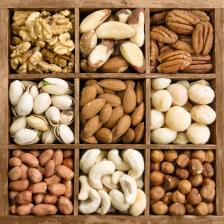Nutty Nutrition Tips
Eat nuts, but don’t go nuts.

How Do Nuts Fit Into a Healthy Diet?
In any case, I just got an email from Chad, asking me to do an episode on nuts and how they fit into a healthy diet. This is a very smart question. Nuts have a lot going for them. There are a whole bunch of large studies showing that people who eat nuts several times a week have a much lower risk of heart disease.
Nuts are very nutrient dense, meaning that they pack a whole lot of nutrition into a small package. Specifically, nuts are rich in antioxidants, fiber, and heart-healthy fats. They also contain nutrients called plant sterols, which help to lower LDL (or “bad”) cholesterol. They can also be an important source of protein for vegetarians.
On the other hand, nuts are also notoriously calorie-dense. That means that they pack a whole lot of calories into a very small package, and that’s exactly the kind of food you want to avoid if you are watching your weight. Station yourself near the nut dish at a cocktail party or football game and you can easily inhale a meal’s worth of calories in a couple of minutes without even realizing it.
Unfortunately, you can’t separate the good from the bad. Adding more nuts to your diet means adding more calories. And it doesn’t matter how nutritious those calories are. Too many extra calories can add up to unwanted weight gain.
Eat Nuts, Just Don’t Go Nuts
So, Chad, here’s my advice for getting the benefits of nuts without paying a penalty.
Include some sort of nuts in your diet almost every day, but in limited amounts. The USDA now recommends eating an ounce to an ounce and a half of nuts per day. How much is that? An ounce is about 20 nuts if you’re talking about larger nuts like almonds or walnuts or around 30 nuts if they are smaller nuts like peanuts or pistachios.
You can also fill your nut quota with an ounce of peanut butter, which is about two tablespoons. For a slightly more grown-up alternative, try almond or cashew butter.
You’ll get the most benefit from nuts by using them instead of other foods that are high in calories but less nutritious. For example, spread your toast with nut butter and banana slices instead of regular butter and jelly. Add chopped nuts to muffins or cookies instead of chocolate chips or candy pieces. Sprinkle toasted nuts on your salad instead of bacon bits or croutons. If you’re feeling snacky, have a small handful of nuts instead of potato chips. (Just be sure to stop at one handful.)
What’s the Best Kind of Nut?
Inevitably, whenever the topic turns to nuts, someone will ask me which nut is best for you. It really depends on what you’re judging by.
In terms of protein content, peanuts take the cake. (That’s probably because peanuts technically aren’t nuts at all; they’re legumes.) Almonds win the prize for most fiber. Pistachios are high in plant sterols, the compounds that help to lower LDL cholesterol.
Brazil nuts are particularly high in antioxidants, especially selenium. Pretty much all nuts are high in monounsaturated fats. But English walnuts have the added distinction of being rich in omega-3 fats, as well.
And here’s a bit of nut trivia for you to dish out at the next cocktail party you attend. Most people think that cashews are higher in fat and calories than other kinds of nuts. Not true at all. In fact, cashews are on the lower end of the spectrum in terms of fat and calories.
Nope, it’s pecans that you want to watch out for! They’re about 20% higher in fat and calories than most other nuts…and that’s before they get baked into pies!
While there are some significant nutritional differences, the studies that found benefits from eating nuts didn’t distinguish peanuts from pecans. So, I suggest that you just eat the ones you enjoy—but, in moderation.
Click here to get my delicious recipe for quinoa salad with pecans and cranberries.
Administrative
This is Monica Reinagel, the Nutrition Diva, with your quick and dirty tips for eating well and feeling fabulous. These tips are provided for your information and entertainment and are not intended as medical advice. Because everyone is different, please work with your health professional to determine what’s right for you.
If you have a comment or nutrition question for me, send an email to or leave me a voice mail at 206-203-1438. You can also follow me on Facebook. I’d really love to hear from you.
And if you’re enjoying this podcast, help me get the word out by posting a review on iTunes. It’s easy! You can also subscribe to my podcasts while you’re there.
RESOURCES:
Nuts image courtesy of Shutterstock

